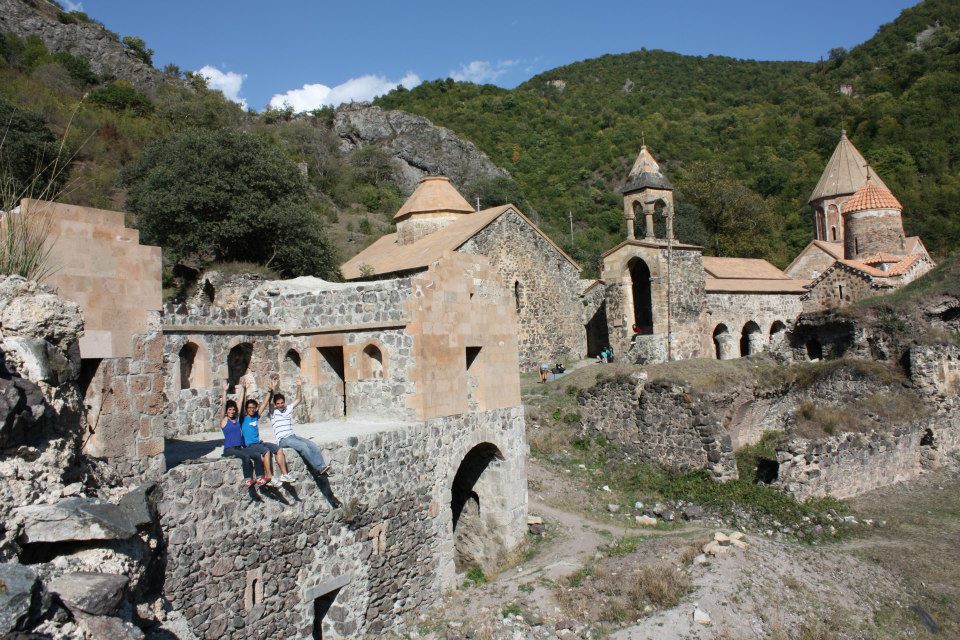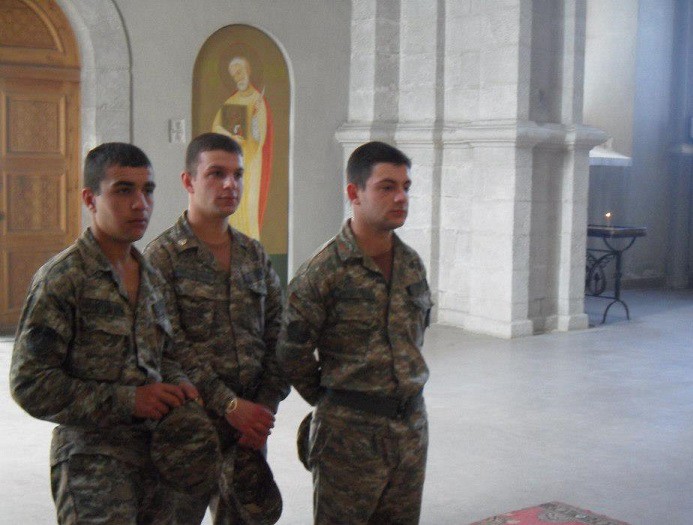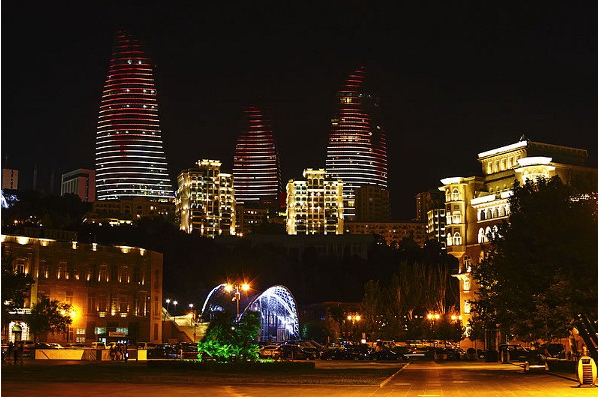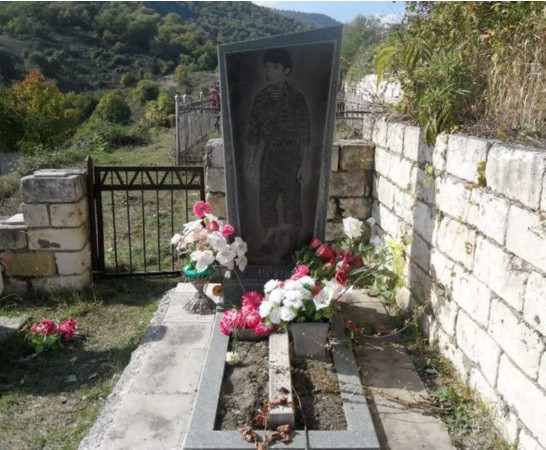Why Won't the Republic of Azerbaijan Blacklist Me?
The country keeps out visitors for two offenses; I committed both.

For at least the past decade, the Republic of Azerbaijan has accumulated a list of hundreds of people who have been declared personae non gratae, forbidden to step foot in the country. The “Arzuolunmaz Şəxslərin Siyahısı” or “List of Undesirable People,” can be found on the Azerbaijani Ministry of Foreign Affairs website. The list provides the name, country of origin, position, and often a photo of the offender, and it includes members of numerous parliaments, journalists from major newspapers, the Spanish opera singer Montserrat Caballé, and even two NASA astronauts.
What the members of this varied group all have in common is having visited a small mountainous region seemingly at the edge of the world. Known as Nagorno-Karabakh or the “Black Garden,” it is a disputed territory populated by ethnic Armenians. It has been de facto independent for the past twenty-five years, but the land on Azerbaijan’s border with Armenia is at the heart of a fierce conflict, and is de jure still part of Azerbaijan.

Azerbaijan, an exotic-sounding name to Western ears, sounds like the very embodiment of a post-Soviet outpost one imagines exists, but with no idea exactly where. There are substantive reasons to know Azerbaijan though: it’s an oil and gas producing nation with almost continuous headline-grabbing repression of journalists and civil society. It gained recent notoriety for the imprisonment and recent release of Khadija Ismayilova, a journalist whose cause was taken up by human rights lawyer Amal Clooney.
Last month, the Formula 1 Grand Prix of Europe ran through the streets of Azerbaijan’s capital, Baku. Sports fans also might have noticed advertisements for Azerbaijan’s national oil company SOCAR, at this summer’s Euro 2016 football championships. The country is also a sponsor of the Atletico Madrid football team. How can a place that aspires to be a recognized as a global player have such a capricious approach to its visitors?
Azerbaijan considers visiting Karabakh without its permission (which it would not grant) to be a violation of international law. The sentence for this crime is a permanent ban from entering Azerbaijan. In addition to the official blacklist, there is a more sinister, unofficial policy based on race alone—this unwritten and unlegislated secondary blacklist applies to anyone with an Armenian last name, or a name that merely sounds Armenian. There have been abrupt deportations of people who arrived in Azerbaijan as part of groups, such as bands, sports teams, journalists, and diplomatic delegations all because of their last names. It has become so commonplace that the U.S. State Department has a warning to citizens trying to get a visa to Azerbaijan, especially if one has also been to Armenia:
U.S. citizens of Armenian ancestry — or even those with Armenian last names — have had their visa applications denied by the Government of Azerbaijan on the grounds that their safety cannot be guaranteed. In 2013, a traveler with an Armenian visa in his passport had his Azerbaijani visa application refused to be accepted for processing.
Not every person of Armenian descent has an Armenian name, and some with Armenian last names have no connection to their heritage, or were married or adopted by an Armenian. This draconian policy also makes cross-cultural exchange and interaction between Armenians and Azerbaijanis almost impossible, something vital to Track II diplomacy in any peace process. These days, most Armenians and Azerbaijanis under age 40 only know each other as an enemy on the other side of a gun.

When the Soviets took over the region after World War I, they at first included Karabakh in the Armenian SSR, and then made it an autonomous region within Azerbaijan SSR instead. However, the Armenian-Azerbaijani border was internal, allowing for free movement and less practical significance. That changed with the Union’s fall in 1991, when the often arbitrarily drawn borders between republics became international boundaries. After seventy years, the conflict over Karabakh exploded anew.

After years of conflict and bloodshed, both sides, along with the unrecognized Republic of Nagorno Karabakh , signed a ceasefire in 1994. It left Armenians in control of most of the region, along with a buffer zone from which hundreds of thousands of Azerbaijanis were displaced. This ceasefire was intended to lay the foundation for peace talks. After several failed attempts at negotiation, Armenian and Azerbaijani soldiers still stare (and sometimes shoot) at each other from bunkers exactly where the fighting halted over twenty years ago.
The institutionalized stigma against Armenians severely undercuts the assertion that Karabakh Armenians would be embraced back into Azerbaijan as welcome and free citizens. Armenia has every reason to be just as spiteful, but it is not: There are many Iranian Azeris in the transport industry, driving Armenia’s roads, and numerous citizens from another historic rival and closest ally of Azerbaijan, Turkey, are welcomed as visitors despite the Turkish blockade of the Armenian border. It is in fact possible to balance security concerns without banning entire peoples.
The blacklist also includes participants in a 2013 research trip by the Johns Hopkins University School of Advanced International Studies (SAIS). Sixteen students and their two professors, represented on the list with photos the Foreign Ministry apparently found on social media, were far from a rogue group of international lawbreakers. They were on one of SAIS’s periodic “Conflict Management Field Trips.” While they were in Azerbaijan, the students met with Elmar Mammadyarov, the republic’s Foreign Minister, and the same man who would later blacklist them.
It is in Azerbaijan’s own interest to recognize the ways in which the Blacklist sabotages its dreams of advancement on the world stage. Mary E. Boyer, one of the blacklisted students, sees her place on the list as a public reminder of the senselessness of the policy. “I am proud to be on the list,” she said, “as gathering information, engaging in cultural exchanges and economic development should be encouraged. By placing non-criminal people on the Blacklist, Azerbaijan is reinforcing the idea that it lacks openness to pursuing a peaceful resolution.”

In September of 2012, I made a trip to Stepanakert, the vibrant capital of Karabakh. Thanks to the lack of publicity surrounding my visit, I have thus far avoided an ignominious spot on the Blacklist, but I deserve it, don’t I? My Armenian last name is already enough to have me unofficially banned without even having visited Karabakh (despite the fact my family has been in the United States now for over a hundred years). If Azerbaijan is serious about blacklisting every visitor to Karabakh, and not just engaged in a long-running counter-productive publicity stunt cherry-picking those who make for good propaganda, they should add me and every other person who can prove having visited Karabakh with no exceptions. After hearing about yet another round of additions to the list in May — this time a group of Bulgarian MPs — I decided to take a rather unorthodox step. For the sake of fairness and consistency, I petitioned Azerbaijan to blacklist me.
I tried tweeting at the Blacklist’s Twitter account, providing photographic proof of my transgression and asking if that was sufficient evidence to join the list. After telling me cryptically that “Armenians are no longer added,” when pressed, it claimed not to be an official mouthpiece for the government anyway and not to concern myself with it. Left dejected and a bit confused, I turned my quest to the Azerbaijani Embassy in Washington, D.C.

The embassy represents a nation that sees itself as cutting edge and up-and-coming, as demonstrated by Baku’s grandly futuristic architecture and its even grander plans to bring itself to the center of global attention. Azerbaijan hosted the 2012 Eurovision Song Contest and the first-ever European Olympics in 2015. Adventurous foreigners like myself have plenty of reasons to visit Azerbaijan if permitted. I made a call to the embassy and laid out my situation: an American who has visited Karabakh but who is not on the Blacklist. They told me they would call me back with answers.
I received an answer of sorts in the form of an international incident. The day after my call, an eight-year old boy from Moscow on a school trip to Baku was stopped at the airport for having an Armenian biological father. His mother said the trip had been cleared with Azerbaijani authorities beforehand, but he was still subjected to a ten-hour detention. His mother vented her frustration to Instagram in a post (since deleted) that went viral, after which the deportation order was reversed and they were allowed to enter the country. One might question the danger a young boy could have posed to Baku, but this vindictive action is better understood in context of a 2012 statement by President Ilham Aliyev that “our main enemies are Armenians of the world.” Even if they are eight years old.

After some more prompting, the embassy responded to my inquiry in a general manner, saying: “in any country, an unauthorized visit to its territory would cause legal consequences. In Azerbaijan, this results in a travel ban to Azerbaijan. This applies to all unauthorized visitors, including those of Armenian background who entered Azerbaijan illegally.” Nothing about whether I was subsequently banned. In the case of the Russian boy, who had not visited Karabakh, they countered that he was allowed into the country eventually, and that it was a procedural matter.
I’m still hoping that Armenians and Azerbaijanis can get to know each other again as more than just enemies. But that day will never arrive until obstacles like the exclusionary policies and blacklist are dispensed with. As for my own quest to get a spot on the blacklist: I’m still waiting.
Paul Sookiasian is a writer and researcher who lived in the region from 2012–2014.
